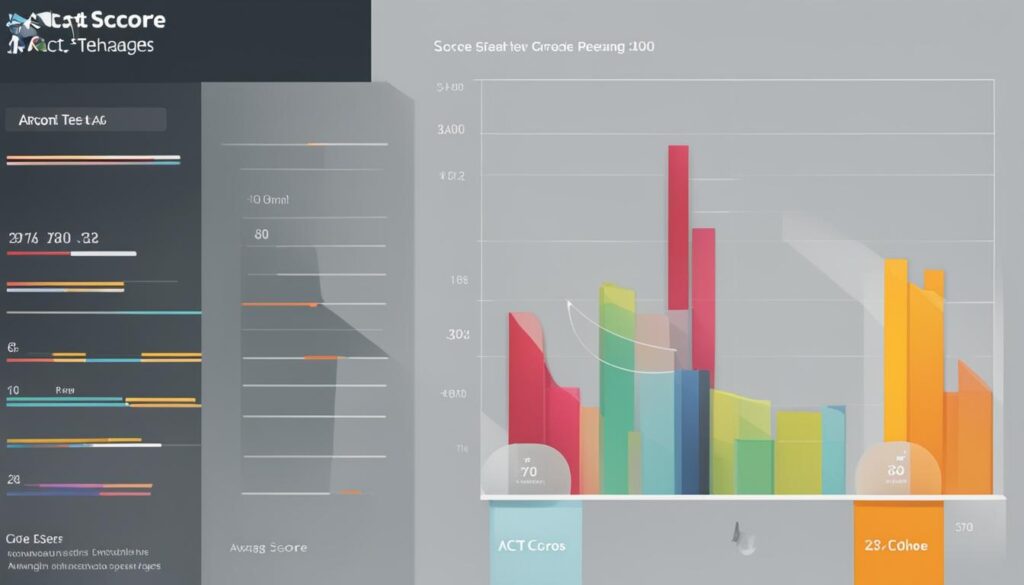The ACT test score range is a crucial factor for students in Hong Kong aiming to gain admission to colleges in the United States. A student's ACT scores play a significant role in college admissions, particularly for top-tier universities.It is important to have a clear understanding of the ACT test and its score range to navigate the competitive application process effectively.
The national average ACT score is 19.9, but for admission to elite colleges, the range of competitive scores typically falls between 32 and 36. Achieving a high ACT score requires adequate preparation, including strategic studying, consistent practice, and effective time management.
While a good ACT score is important, it is just one component of a holistic college application. Admissions committees also value a student's academic achievements, extracurricular engagements, essays, and letters of recommendation. Seeking expert guidance can help students develop a comprehensive admissions strategy and enhance their chances of success.
Key Takeaways:
- ACT scores are critical for college admissions, particularly for highly selective institutions.
- Competitive ACT scores for top-tier universities generally range between 32 and 36.
- Preparation, consistent practice, and effective time management are essential for achieving a high ACT score.
- A holistic college application approach that includes academic achievements, extracurricular engagements, essays, and recommendations are crucial.
- Expert guidance can enhance a student's admissions strategy and increase their chances of success.
Importance of ACT Scores in College Admissions
ACT scores play a significant role in the college admissions process, particularly for students aspiring to attend elite universities. While some colleges have adopted test-optional policies, strong ACT scores can still greatly enhance a student's application. Achieving high scores demonstrate academic proficiency and can make an applicant more competitive in the admissions pool.
One of the reasons ACT scores hold importance is their ability to showcase a student's academic strengths. Admissions officers use these scores as a quantitative measure of a student's intellectual capabilities. A high ACT score can distinguish an applicant from others, increasing their chances of being admitted to prestigious institutions.
Furthermore, ACT scores contribute to a holistic application approach. Colleges value well-rounded students who excel academically while also participating in extracurricular activities and exhibiting leadership skills. A strong ACT score adds weight to an applicant's profile, demonstrating their commitment to academic excellence.
Admissions officers consider a variety of factors when evaluating applications, and ACT scores are just one piece of the puzzle. However, for selective colleges, a competitive ACT score can make a significant difference in the admissions decision.
In addition to enhancing an applicant's competitiveness, high ACT scores can also open doors to scholarship opportunities. Many colleges offer merit-based scholarships to students with exceptional scores. These scholarships can alleviate the financial burden of college tuition and provide students with valuable resources to support their education.
Overall, while colleges consider a range of factors during the admissions process, ACT scores remain an important component. They can serve as a strong indicator of a student's academic abilities and contribute to a holistic application. With strategic preparation and dedication, students can maximize their ACT scores and increase their chances of gaining admission to their desired colleges and universities.
Understanding the ACT Scoring Structure
The ACT is scored on a scale of 1 to 36, providing colleges with a standardized measure of a student's academic abilities. The composite score, which ranges from 1 to 36, is calculated by averaging the scores of the four main sections of the test: English, Mathematics, Reading, and Science. Each section is also scored on a scale of 1 to 36, with scores representing the student's performance in that particular area.
The ACT also offers an optional writing test, which is scored separately on a scale of 2 to 12. It is important to note that the writing score is not included in the composite score. The writing test evaluates the student's ability to analyze and develop complex ideas and present them in a clear and organized manner.
In addition to the numerical scores, ACT provides a percentile rank for each student. Percentile ranks indicate the percentage of test-takers who scored lower than the student. For example, if a student has a percentile rank of 85, it means they performed better than 85% of test-takers. Percentile ranks are important for colleges to evaluate a student's performance relative to their peers and make informed admissions decisions.
| ACT Section | Score Range |
|---|---|
| English | 1-36 |
| Mathematics | 1-36 |
| Reading | 1-36 |
| Science | 1-36 |
| Composite | 1-36 |
| Writing (Optional) | 2-12 |
The ACT scoring structure provides colleges with a comprehensive overview of a student's abilities in different academic areas. It is important for students to understand this structure and how their scores are interpreted by colleges during the admissions process.
Average ACT Scores and Percentiles
Understanding the average ACT scores and percentiles can provide valuable insights into a student's performance compared to their peers. The average composite ACT score for the 2023-24 academic year is 19.9. However, it's important to remember that average scores can vary depending on the specific criteria and standards of each institution.
| ACT Section | Average Score |
|---|---|
| English | 20.2 |
| Mathematics | 20.5 |
| Reading | 21.3 |
| Science | 20.8 |
Percentile scores are another important aspect to consider when evaluating ACT performance. Percentiles indicate how a student's scores compare to those of other test-takers. For example, a score in the 75th percentile means the student performed better than 75% of test-takers.
Here is a breakdown of the ACT score percentiles:
- 25th Percentile: 16-19
- 50th Percentile (Median): 20-23
- 75th Percentile: 24-27
- 90th Percentile: 28-31
- 99th Percentile: 32-36
These percentiles provide a comparative view of a student's performance and help assess their competitiveness in the college application process. It's important to strive for scores that position students within the desired percentile range for their target colleges.
ACT Score Ranges for Top-Tier Universities
When it comes to gaining admission to top-tier universities in the United States, achieving a competitive ACT score is crucial. While each institution sets its own standards and requirements, a general understanding of ACT score ranges can help aspiring students assess their chances of acceptance and plan their admissions strategy accordingly.
For students aiming to secure a spot in a top 20 US university, a competitive ACT score typically falls between 32 and 36. These scores position students within the 75th percentile of admitted students and significantly increase their chances of acceptance. It is important to note that these score ranges are not fixed and may vary slightly depending on the specific institution and other factors such as GPA, essays, extracurricular activities, and letters of recommendation.
To provide a more comprehensive overview, refer to the table below which showcases the average ACT score ranges for a selection of top US universities:
| University | ACT Score Range |
|---|---|
| Harvard University | 33-35 |
| Stanford University | 32-35 |
| Massachusetts Institute of Technology (MIT) | 34-36 |
| Princeton University | 33-35 |
| Columbia University | 33-35 |
It is important to remember that ACT scores are just one component of a holistic application. While a strong ACT score can enhance a student's competitiveness, colleges also value other aspects of a student's academic profile. It is essential for students to focus on maintaining a stellar GPA, writing compelling essays, engaging in meaningful extracurricular activities, and securing impressive letters of recommendation to strengthen their overall application.
Importance of Knowing ACT Score Ranges for College Applications
When it comes to college admissions, understanding the ACT score ranges of the institutions you aspire to is essential. By knowing the average ACT scores of admitted students, you can assess your own standing among other applicants and gain insight into your competitiveness. This knowledge allows you to tailor your college application strategy accordingly and make informed decisions .
Having an awareness of the ACT score alignment with your target institutions enables you to set realistic goals and expectations. It helps you determine whether your current ACT scores meet the requirements of your desired colleges or if you need to focus on test preparation to improve your chances of acceptance. By comparing your ACT scores to the average scores of admitted students, you can gauge your academic profile's strength and identify areas for enhancement.
Additionally, understanding the ACT score ranges allows you to strategically choose the colleges you apply to. By targeting institutions where your ACT scores fall within the desired range, you increase your likelihood of acceptance. On the other hand, if your ACT scores are significantly below the average of a specific institution, you may need to consider other factors, such as your GPA, extracurricular activities, and personal statement, to strengthen your application.
| College | Average ACT Score Range |
|---|---|
| XYZ University | 30-34 |
| ABC College | 26-29 |
| PQR University | 27-31 |
“Understanding the ACT score ranges of colleges is crucial for students aiming to maximize their chances of acceptance. By aligning your ACT scores with the average scores of admitted students, you can assess your competitiveness and strategize your college application accordingly.”
In conclusion, being aware of the ACT score ranges for college admissions allows you to make informed decisions about your application strategy, set realistic goals, and maximize your chances of acceptance. By understanding how your ACT scores align with the average scores of admitted students, you can your competitiveness and tailor your gauge academic profile to meet the expectations of your desired colleges.
Factors Influencing a Good ACT Score
While a high ACT score can significantly enhance a college application, it is important to remember that top institutions also prioritize other components. These include a student's GPA, essays, extracurricular engagements, and letters of recommendation. A well-rounded and compelling profile involves a holistic approach that ensures each element complements one another.
Admissions officers take into account a student's academic achievements beyond standardized test scores. A strong GPA demonstrates a student's ability to excel in their coursework and showcases their dedication to pursuit academics. Alongside a high ACT score, a competitive GPA enhances a student's overall academic profile and increases their chances of admission.
Essays provide an opportunity for students to showcase their unique perspectives, experiences, and writing skills. Admissions officers look for well-written and thoughtful essays that reveal a student's personality, values, and potential contribution to the campus community. A compelling essay can make a significant impact on an admissions decision, even if a student's ACT score is slightly below average.
Extracurricular engagements, such as participation in clubs, sports, community service, and leadership roles, demonstrate a student's passion, commitment, and ability to balance multiple responsibilities. They provide evidence of a student's interests and achievements outside of the classroom and can strengthen their college application. Admissions officers value students who have made a positive impact in their communities through their extracurricular involvements.
Letters of recommendation from teachers, counselors, or mentors can offer valuable insights into a student's character, work ethic, and potential for success. These letters provide an external perspective on a student's academic abilities, personal qualities, and potential for growth. Strong letters of recommendation can validate a student's achievements and contribute to a positive evaluation of their application.

Overall, while a good ACT score is important for college admissions, it is crucial to recognize that GPA, essays, extracurricular engagements, and letters of recommendation also play significant roles in the evaluation process. Admissions officers seek well-rounded individuals who have demonstrated academic excellence, personal growth, and a commitment to their communities. By excelling in these areas and presenting a compelling profile, students can enhance their chances of gaining admission to their desired colleges and universities.
ACT Score Conversion and Comparisons
When it comes to college admissions, students often wonder how their ACT scores stack up against SAT scores. While the two exams assess different aspects of a student's academic abilities, it is possible to convert ACT scores to SAT scores for comparison purposes. By understanding the ACT to SAT score conversion, students can gain valuable insights into their performance and competitiveness.
There are several resources available online that offer ACT to SAT score conversion tools. These tools use statistical data to estimate SAT scores based on ACT performance. By inputting their ACT scores, students can receive an approximately equivalent SAT score. This conversion can be helpful for students who want to explore college options that require SAT scores or for comparison purposes when considering the strengths of their ACT scores.
It is important to note that while ACT to SAT score conversion can provide a general idea of how the two exams correlate, the conversion is not exact. Each test measures different skills and knowledge, and colleges understand this distinction. It is always recommended for students to focus on performing well on the exam they have chosen rather than relying solely on score conversions.
| ACT Score | Estimated SAT Score |
|---|---|
| 30 | 1390-1440 |
| 25 | 1200-1230 |
| 20 | 1030-1060 |
Table: Estimated SAT Scores based on ACT performance
Remember, both ACT and SAT scores are just one component of a student's college application. Admissions committees consider various factors, including GPA, extracurricular activities, essays, and letters of recommendation. While it can be helpful to compare ACT and SAT scores, it is It is equally important for students to focus on presenting a well-rounded application that highlights their unique strengths and accomplishments.
Strategies for ACT Preparation and Improvement
Preparing for the ACT can be a challenging task, but with the right strategies, students can enhance their scores and increase their chances of college admission. Here are some effective strategies for ACT preparation and improvement:
Create a Study Schedule
Developing a study schedule is crucial for organizing your time and ensuring consistent and focused preparation. Set aside dedicated time each day or week to review different sections of the ACT. This schedule will help you stay on track and cover all the necessary material before test day.
Take ACT Practice Tests
Practice tests are invaluable resources for familiarizing yourself with the format and content of the ACT. They allow you to identify your areas of strength and weakness, enabling you to focus your study efforts accordingly. Make sure to simulate real test conditions by timing yourself and taking the practice tests in a quiet environment.
Focus on Time Management
Time management is essential during the actual ACT exam. Work on improving your speed and accuracy by practicing time-bound exercises and questions. Familiarize yourself with the pacing and structure of each section so you can efficiently allocate your time and complete all questions within the given timeframe.
By following these strategies, students can optimize their ACT preparation and increase their chances of achieving higher scores. Remember, consistent practice, a well-structured study schedule, and effective time management are key to success on the ACT.
Evaluating What Makes a “Good” ACT Score for Personal Goals
When it comes to determining what constitutes a “good” ACT score, it's important to consider personal goals and target institutions. Each student's aspirations and desired colleges may vary, and what may be considered a strong score for one individual may be different for another. Factors such as initial practice test scores, GPA alignment, and the average scores of accepted students at desired colleges should be taken into account when evaluating what makes a “good” ACT score.
For students who have specific target institutions in mind, researching the average ACT scores of admitted students can provide valuable insights. By comparing one's own practice test scores and GPA to the average scores of accepted students, individuals can gauge their competitiveness and determine their target ACT score range.
It's important to note that in addition to ACT scores, colleges also value other aspects of an applicant's profile, such as essays, extracurricular engagements, and letters of recommendation. While a strong ACT score can enhance a college application, it should be viewed as part of a holistic approach that encompasses all aspects of an individual's academic profile.
| Personal Goals | GPA Alignment | Target Institutions |
|---|---|---|
| Aspiring to attend a top-tier university | Striving for a high GPA to match the academic standards of desired colleges | Researching the average ACT scores of admitted students at target institutions |
| Seeking scholarship opportunities | Maintaining a strong GPA to meet scholarship requirements | Identifying the ACT score ranges necessary for eligibility |
| Exploring a range of college options | Ensuring a solid GPA to meet the general admission requirements of various colleges | Considering the average ACT scores of accepted students at different institutions |
Taking into account personal goals, GPA alignment, and target institutions is essential for evaluating what constitutes a “good” ACT score. By aligning one's ACT score target with the average scores of admitted students at desired colleges, students can gain a clearer understanding of their competitive standing in the admissions process.

Quote:
“Evaluating what makes a ‘good’ ACT score is a personal journey that requires careful consideration of individual goals and the standards of target institutions.” – College Admissions Expert
Conclusion
The understanding of the ACT test score range is crucial for students in Hong Kong who are aiming to gain admission to colleges in the United States. While obtaining a good ACT score is important, it is just one component of a holistic college application. Students should strive for scores that align with the average scores of admitted students at their target institutions and complement their overall academic profile.
However, it is essential to remember that ACT scores are not the sole determining factor in college admissions. Colleges also value other aspects of a student's application, such as GPA, essays, extracurricular engagements, and letters of recommendation. A well-rounded and compelling profile involves a holistic approach that ensures each element complements one another.
To increase the likelihood of success in the college admissions process, students should engage in adequate preparation. This includes strategic studying, consistent practice, and effective time management. Students can also benefit from expert guidance provided by resources like Getutor, which offers free matching services for private tutors. With the right preparation and guidance, students can enhance their chances of achieving their desired ACT test scores and gaining admission to their dream colleges.
FAQ
What is the ACT test score range?
The ACT test is scored on a scale of 1 to 36, with the composite score being the average of the four main sections: English, Mathematics, Reading, and Science. Each section is graded on a scale of 1 to 36.
What is the national average ACT score?
The national average composite ACT score is 19.9 for the 2023-24 academic year.
What score range is considered competitive for top-tier universities?
Competitive ACT scores for top-tier universities generally range between 32 and 36. These scores position students within the 75th percentile of admitted students.
Are ACT scores the only factor colleges consider in admissions?
No, colleges also value a holistic application approach. Factors such as GPA, essays, extracurricular activities, and letters of recommendation also play a significant role in college admissions.
How do ACT scores compare to SAT scores?
There are resources available for ACT to SAT score conversion, which can help students compare their ACT scores to SAT scores if needed.
How can students improve their ACT scores?
Consistent preparation, including strategic studying, practice tests, and time management strategies, can help students improve their ACT scores.
How can students determine what makes a “good” ACT score?
Factors to consider include initial practice test scores, GPA alignment, and the average scores of accepted students at desired colleges. Students should establish a benchmark based on their personal goals and target institutions.
Why is it important to know ACT score ranges for college applications?
Understanding ACT score ranges can help students assess their competitiveness and likelihood of acceptance at their target institutions.




